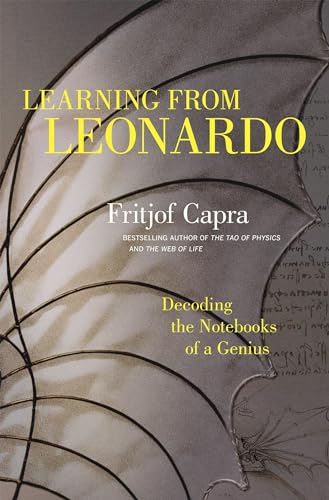Items related to Learning from Leonardo: Decoding the Notebooks of a...

Synopsis
“This remarkable exposition of Leonardo’s work” illuminates how he was centuries ahead of his time—and the lessons we can learn from his style of thought (Edward O. Wilson, Harvard University).
Leonardo da Vinci was a brilliant artist, scientist, engineer, mathematician, architect, and inventor. But he was also, Fritjof Capra argues, a profoundly modern man. Capra’s decade-long study of Leonardo’s fabled notebooks reveal him as a “systems thinker” centuries before the term was coined. Leonardo believed the key to understanding the world was in perceiving the connections between phenomena and the larger patterns formed by those relationships.
Seeing the world as a dynamic, integrated whole, Leonardo often used concepts from one area to illuminate problems in another. For example, his studies of the movement of water informed his ideas about how landscapes are shaped, how sap rises in plants, how air moves over a bird’s wing, and how blood flows in the human body. His observations of nature enhanced his art, his drawings were integral to his scientific studies and architectural designs.
Capra describes seven defining characteristics of Leonardo da Vinci’s genius and includes a list of over forty discoveries Leonardo made that weren’t rediscovered until centuries later. His overview of Leonardo’s thought follows the organizational scheme Leonardo himself intended to use if he ever published his notebooks. So in a sense, this is Leonardo’s science as he himself would have presented it.
"synopsis" may belong to another edition of this title.
About the Author
Fritjof Capra, PhD, physicist and systems theorist, is a founding director of the Center for Ecoliteracy. Capra is on the faculty of Schumacher College in England and frequently gives management seminars for top executives. He is the author of several international bestsellers, including The Tao of Physics, The Turning Point, The Web of Life, The Hidden Connections, and The Science of Leonardo.
"About this title" may belong to another edition of this title.
FREE shipping within U.S.A.
Destination, rates & speedsSearch results for Learning from Leonardo: Decoding the Notebooks of a...
Learning from Leonardo: Decoding the Notebooks of a Genius
Seller: ThriftBooks-Reno, Reno, NV, U.S.A.
Hardcover. Condition: As New. No Jacket. Pages are clean and are not marred by notes or folds of any kind. ~ ThriftBooks: Read More, Spend Less 1.82. Seller Inventory # G1609949897I2N00
Quantity: 1 available
Learning from Leonardo: Decoding the Notebooks of a Genius
Seller: ThriftBooks-Phoenix, Phoenix, AZ, U.S.A.
Hardcover. Condition: Very Good. No Jacket. May have limited writing in cover pages. Pages are unmarked. ~ ThriftBooks: Read More, Spend Less 1.82. Seller Inventory # G1609949897I4N00
Quantity: 1 available
Learning from Leonardo: Decoding the Notebooks of a Genius
Seller: ThriftBooks-Reno, Reno, NV, U.S.A.
Hardcover. Condition: Very Good. No Jacket. May have limited writing in cover pages. Pages are unmarked. ~ ThriftBooks: Read More, Spend Less 1.82. Seller Inventory # G1609949897I4N00
Quantity: 1 available
Learning from Leonardo: Decoding the Notebooks of a Genius
Seller: ThriftBooks-Dallas, Dallas, TX, U.S.A.
Hardcover. Condition: Good. No Jacket. Pages can have notes/highlighting. Spine may show signs of wear. ~ ThriftBooks: Read More, Spend Less 1.82. Seller Inventory # G1609949897I3N00
Quantity: 1 available
Learning from Leonardo: Decoding the Notebooks of a Genius
Seller: ThriftBooks-Dallas, Dallas, TX, U.S.A.
Hardcover. Condition: As New. No Jacket. Pages are clean and are not marred by notes or folds of any kind. ~ ThriftBooks: Read More, Spend Less 1.82. Seller Inventory # G1609949897I2N00
Quantity: 1 available
Learning from Leonardo: Decoding the Notebooks of a Genius
Seller: ThriftBooks-Dallas, Dallas, TX, U.S.A.
Hardcover. Condition: Very Good. No Jacket. May have limited writing in cover pages. Pages are unmarked. ~ ThriftBooks: Read More, Spend Less 1.82. Seller Inventory # G1609949897I4N00
Quantity: 1 available
Learning from Leonardo: Decoding the Notebooks of a Genius
Seller: ThriftBooks-Atlanta, AUSTELL, GA, U.S.A.
Hardcover. Condition: Very Good. No Jacket. May have limited writing in cover pages. Pages are unmarked. ~ ThriftBooks: Read More, Spend Less 1.82. Seller Inventory # G1609949897I4N00
Quantity: 1 available
Learning from Leonardo: Decoding the Notebooks of a Genius
Seller: ThriftBooks-Atlanta, AUSTELL, GA, U.S.A.
Hardcover. Condition: Good. No Jacket. Pages can have notes/highlighting. Spine may show signs of wear. ~ ThriftBooks: Read More, Spend Less 1.82. Seller Inventory # G1609949897I3N00
Quantity: 1 available
Learning from Leonardo: Decoding the Notebooks of a Genius
Seller: ThriftBooks-Atlanta, AUSTELL, GA, U.S.A.
Hardcover. Condition: As New. No Jacket. Pages are clean and are not marred by notes or folds of any kind. ~ ThriftBooks: Read More, Spend Less 1.82. Seller Inventory # G1609949897I2N00
Quantity: 1 available
Learning from Leonardo: Decoding the Notebooks of a Genius
Seller: SecondSale, Montgomery, IL, U.S.A.
Condition: Acceptable. Item in acceptable condition! Textbooks may not include supplemental items i.e. CDs, access codes etc. Seller Inventory # 00082673848
Quantity: 1 available

